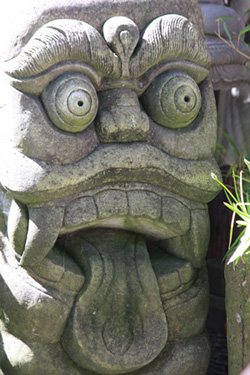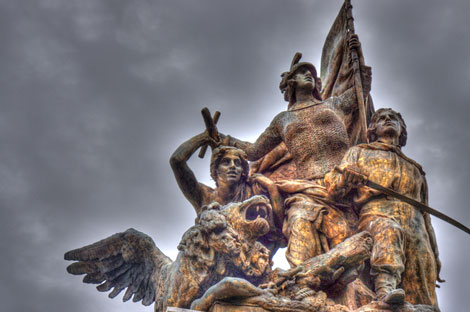by Alan Briskin | Conflict, Politics

Recently, I became acquainted with the concept of hauntology – a philosophy of history originating with the philosopher Jacques Derrida. It has been called the logic of ghosts because it upsets the easy progression of time as always moving forward in measured sequence and proposing instead that the present is simultaneously haunted by the past and the future. It is the logic of the specter, the shade, the blurring of distinctions among conventional categories that keep us safe but also isolated. Hauntology is the unsettling knowledge that our actions are neither cut off from history or immune to the forces of evolution.
From this perspective, the tea party takes on significance beyond its meaning in the moment.
All around this movement are shades of ghosts past and in particular the shade of those original Massachusetts colonists which gave the tea party its name. On December 16, 1773, dozens of colonists made a statement against British rule by destroying tea that bore a tax imposed by Britain (similar to duties it charged in Britain) but not authorized by local representatives. In New York and Philadelphia, the tea was sent back to Britain rather than pay duties and in Charleston, Virginia, the tea was left to rot because colonists refused to unload it. But in Boston, there was an outright revolt with a group of colonists throwing the tea overboard.
The spectacular show of resistance served to unite the various British political parties and in a display of solidarity they forced the closing of the Boston harbor and instituted a series of laws called the Coercive Acts, referred to by the colonists as the Intolerable Acts. And in turn, these coercive measures served to unite the colonists – for the most part. Samuel Adams argued the actions of the group who threw the tea overboard were a principled stand and not a lawless mob; Benjamin Franklin thought there should be reimbursement for the destroyed tea. At minimum, there was ambivalence among the colonists about the destruction of property, yet a seed of pride in their defiance. It took over a half a century for the seed to grow into what today we refer routinely to as the “Boston Tea Party” instead of simply “the destruction of the tea.” A party is far more celebratory than simply destroying things.
From most historical perspectives, the Boston tea party served to accelerate the political will to separate from Britain and led to the convening of the First Continental Congress which felt compelled to respond to the Coercive Acts. Britain, already reeling in debt because of its sustained military engagements, would now face a new insurgency and the eventual unraveling of its Empire. What was crystal clear at the time was that the “other” was in the wrong.
Read Part III of this five-part series: Serving the Ghosts of Defiance and Resentment
by Alan Briskin | Conflict, Humor, Politics

One of the fundamental questions for those who believe in listening, respect, and tolerance for others is what to do with people who appear to us as dominating, certain of their positions, and intolerant of those who disagree with them. A most recent example in the political sphere is the emergence of the tea party movement and the ambiguity of what they represent collectively – a group formed out of anger with simplistic prescriptions for what troubles us – our economy, our communities, and our very souls – or a spirited group of rabble rousers calling us to limit the size of government and renew our faith in god, country, and individual imitative.
What does the tea party represent for our collective wisdom or does it represent the annihilation of wisdom and the descent into chaos?
On the surface, the tea party can simply represent a long and documented American history of intolerance for immigrants, a strong strand of anti intellectualism, and a hyper identification with broad concepts such as freedom and liberty but without depth or subtlety.
In satirizing this pattern of thinking, the comedian Stephen Colbert stated, during testimony to Congress on immigration reform, that “My great grandfather did not travel over 4,000 miles of the Atlantic Ocean to see this country overrun by immigrants.” And in a separate statement, playing on his character of an ultra right wing television host, Colbert promoted his March to Keep Fear Alive by declaring that “America, the Greatest Country God ever gave Man, was built on three bedrock principles: Freedom. Liberty. And Fear — that someone might take our Freedom and Liberty.”
I find much relief in Colbert’s satiric wit, an example how our cultural shadow can be illuminated through humor and how the fragmentation of thought – an immigrant relative used to illustrate his argument against immigration – can be recognized by transforming it into absurdity.
At a deeper level, however, I remain troubled by the implications of the movement and the further polarization it evokes. The enthusiasm of the Obama election has given way, at least for the moment, to despair among many who supported him that the mid term elections will represent a retreat into apathy and fear. From the right Obama is eviscerated for turning away from capitalism to socialism, for trillions of dollars of new Federal spending, and for wanting to raise taxes on individuals who have demonstrated success in the free market economy that is so dear to them. From the left he is chastised for not accomplishing enough with a Democratic majority in the House and Senate, for not articulating a new vision of economic progress that challenges the self interest of capitalism, for continued militarism, and for failing to back strongly enough what was viewed as game changing policies such as a public option in health care, a carbon tax, and a faster and more complete withdrawal from the wars in Iraq and Afghanistan. And as absurd as it may seem, he is disparaged from all corners for not finding a way to bring us together. I suspect the proper question is not “How is Obama doing?” so much as “How are we doing?”
It is in this larger context that the tea party operates, a polarized electorate creating the conditions for a group of people who feel certain, at least of their distaste of Obama and for what they believe he stands for. And whether their number is three million or thirty million, a political window has opened for them to grow larger, feeding off of the discouragement of those who thought a new day was coming as well as on the desire of an opposition political party to ally itself with new energy. Where does this lead – to collective wisdom or collective folly?
It is at this crossroads that my thinking veers off the conventional lanes of political discussion and goes looking for new perspectives.
Read Part II of this five-part series: The Logic of the Ghost
by Alan Briskin | Business, Collective Wisdom, Community, Conflict, Leadership, Photography

Robert Moffat, senior vice president of IBM systems and technology group, was recently arrested by the FBI for conspiracy involving insider trading. The arrest sent shock ways through Wall Street exposing illicit, back channel dealings between prominent high tech executives and hedge fund managers. My information comes directly from Fortune Magazine, also seemingly shocked by it all, and reminding me of the policeman character in Casablanca played by Claude Rains who closes Rick’s Café by telling Humphrey Bogart, “I’m shocked, shocked to find out that gambling is going on here.”
Robert Moffat apparently was a hard working and respected executive considered a potential successor for CEO at IBM. The Fortune article describes him as a numbers cruncher, former Eagle Scout, and a man weighing in at 6-foot-2 and 265 pounds – a solid guy on all fronts. He had become sexually involved with a woman who worked for a hedge fund and she was quoted saying that trading business information was for her “like an orgasm.” The tale becomes more complicated as she was in love with her married hedge fund boss but it didn’t work out. Shocking.
One of Moffat’s attorney colleagues summed it up best: “There was no planet on which I could have understood what was being said about Bob. I just shut down.”
So we have insider trading among millionaires and billionaires, an Eagle Scout who seems to have it all risking everything, a woman who finds stimulation rubbing shoulders (at least) with powerful men, and another man who simply cannot comprehend how a straight shooter like Bob could go wrong. Well, there certainly is a lot to be shocked about. What we have here is a collective collapse. Most disturbing to me is the notion expressed by Bob’s colleague that he knows of no planet to understand what happened?
SEARCHING FOR NEW PLANETS
To be simply less shocked is not an answer to collective collapse but instead an even more cynical and destructive position. Following the lead of Bob’s attorney friend, I propose we look for new planets in which this behavior can be understood. We must also look for planets in which terms such as business ethics and collective wisdom are real practices as opposed to oxymorons.
PLANET INNER GALLEON (named after a hedge fund, Galleon Group, involved in the scandal):
On planet Inner Galleon, people are acutely aware of self-deception and self justification. Business schools take seriously the Arbinger Institute’s caution that “Over time, as we betray ourselves, we come to see ourselves in certain self justifying ways.” People on this planet have become comfortable acknowledging that collective folly is always a possibility in groups and that while we are capable of extraordinary acts of grace and kindness, we are also capable of acts of cruelty and deception. People on this planet embrace this paradox and thereby become more capable of wisdom.
They are also acutely aware that unlike the mythic view of the alpha male protecting the troops, spearheading the hunts, being exemplars, and keeping order among the group, the top ranking males are closer to their baboon ancestors in looking after themselves, seeking access to females, and always scouting for the highest and safest spot in the tree to protect themselves. This collective self knowledge allows them to speak intelligently about rules and regulation for the group and for choosing wisely those people who will administer the regulations. Even more critical, an ethic of doing what is right is reinforced constantly among the members of the group who deal directly with power and money because everyone recognizes its seductive influences. The community realizes that self deception and collective folly do not happen overnight but build slowly within a community and take root when no one seems to notice or care.

PLANET SAVATTHI (named after an ancient city in India)
On planet Savatthi, there is great regard for community and a deep understanding that all of us can get caught up in addictions of alcohol, drugs, gambling, and careless sexuality. There is a belief that guides them that these addictions represent an inner suffering and must be addressed by finding the proper antidotes within a loving community, including prayer, meditation, and healthy conversations. The people of Savatthi pay great attention to their physical and emotional environment, always cultivating beauty and reverence mixed with earthy humor and outright irreverence. On this planet, looking out for oneself or just your immediate friends and relatives is considered selfish. Both the community and planet itself is viewed as medicine, if taken properly.
On planet Savatthi, people take seriously that to lead a happy life one has to live in the company of wise and caring friends and that a community should honor those who truly contribute to the greater good of the whole. They understand one must constantly practice speaking generously from the heart and that words and deeds must be aligned.
To seek happiness on this planet means to live a simple life and to constantly marvel and delight in small things. To remain humble is understood as the greatest asset and that to pretend humility is an act of serious insincerity. Children are taught that when they speak, they should not hope that no-one disagrees with them, because without disagreement, self righteousness can flourish.
To persevere and to be open to change is considered the greatest gift and the greatest challenge. Everyone is asked to contribute their particular talent or gift and everyone is expected to cultivate their talents and apply them to a craft or profession.
PIERCING THE VEIL
No doubt these planets are obscured by heavy mist and clouds, but we are capable of knowing they are there just as we would not forget the moon exists because of a cloudy evening. We can and must look beyond our current world or we will shut down, caught in confusion and disbelief. We are explorers by nature; let us travel together in wisdom.
Further Resources:
The Power of Collective Wisdom: And the Trap of Collective Folly
Leadership and Self Deception by Arbinger Institute
Dangerous Liaisons AT IBM: Fortune Magazine, July 26th, 2010
Two Treasures by Thich Nhat Hanh, including his explanation of the Mangala Sutta
Pure Water: Poetry of Rumi, Coleman Barks – mp3 found on i-tunes
by Alan Briskin | Conflict
A couple of weeks ago, I had the pleasure of speaking to an evening class at San Francisco State in their Wholistic Health department. The course, A Season for Non Violence, focused on applying principles of love and wisdom to daily life and the particular class I attended was on “mending the social divide.” I wondered what social divide could they mean, but then I woke up, made some coffee and braced myself for the morning paper.
As I prepared my talk and discussed it with colleagues, I became aware that non violence is not for the conflict averse. The history of civil disobedience and non violence is a wild collision of philosophical understanding, spiritual insight, individual commitment to ethical choice, and collective action. The historical plum line that links Ralph Waldo Emerson, Henry David Thoreau, Mahatma Gandhi, Howard Thurman, Martin Luther King, and Nelson Mandela is a tale of uncomfortable and conflictual feelings within that elevates toward a higher and more complex understanding of our interconnectedness.
What was hopeful and inspiring for me was the class itself, a mix of mostly young men and women from all over the world and a cross section of economic class.
There were two women whose parents were born in different parts of India talking about entrepreneurial ventures in education, an African American woman from West Oakland who told me she had been asked to give the commencement address at her former middle school, and a young man who wanted to rekindle the American lyceum movement of the early 1800’s, a voluntary movement focused on adult learning by addressing topics of current interest.
In our group discussion, the perspectives varied widely, with one man wanting to know the structural changes needed to create a just world, a woman acknowledging sometimes feeling overwhelmed and even paralyzed, and a third saying that the ideas of the class that inspired her has also made her seem slightly odd to others in her social network. After the class was over, a student told me she had been exhausted and considered skipping class and sleeping but was now feeling refreshed.
Somewhere in the background of my mind, the tune “Don’t you know the world is falling apart” is playing, but not this evening in San Francisco where the subject of mending the social divide found a real and inspiring chorus. Reb Zalman's signature line, "Together we can get it together" was alive and well.
by Alan Briskin | Collaboration, Collective Folly, Collective Wisdom, Conflict, Conscious Capitalism, Consciousness, Politics

A serial journal of cogent reflections and irreverent insights on the social effects of capitalism and the roots of partisan politics. Pairing prose with HDR photography and “flash points” drawn from current and historical perspectives, the author seeks to recover lost wisdom and courageous action beyond the shouting and noise of today’s headlines.
Chapter Sixteen
The Dark Prophet
Part II: Capitalism’s Shadow
Time Range: 1867-1883, 2012
It is easy to dismiss Marx as a revolutionist or even as a theorist of socialism, but much harder to ignore his warnings about capitalism. He had discovered the Achilles’ heel of economic arrangements that celebrated their ability to create prosperity, generate innovation, and provide a bounty of goods and services as well as jobs. Capitalism proclaimed itself the final act in the history of economic evolution. Marx refuted the claim. His diatribes, as painful and polarizing as they were, force us to become conscious of capitalism’s other consequences.
We are confronted with capitalism’s shadow, the dependence on jobs defined solely by the marketplace, the depletion of natural resources, and the addiction to material gratification and personal glory out of sync with spiritual, community, and personal growth.
Yet, for all these dark prophecies, they are still within the imagination to address. There is ample evidence of the power of human collaboration combined with science and social purpose to tackle even the most difficult social issues. The darkest prophecy that Marx left us was not about economic concentration, ecological destruction, or the effects of inequality. It was about ourselves. It was about human polarization, the nature of privilege, and feelings of revenge – things Marx understood deeply in his bones.

HDR (High Dynamic Range) Photography by Alan Briskin: multiple shots at different exposures are combined into one image in order to show “more of what’s there”.
His prophecy of successive business crises, continual warfare between nations, depletion of the earth’s resources, and mounting cynicism among the middle and lower classes was all predicated on the belief that government would do nothing about it. He believed that government would be a protector of the dominant classes — even as the dominant classes battled each other — or at best impotent, paralyzed to do anything significant about the crises that would unfold in waves.
Government officials railed Marx, in tones similar to a tormented Dr. Seuss, could not, would not stand up to the monied interests that supported their rise to political power and punished these same politicians if they deviated too sharply from the social narrative of economic growth. And that narrative was synonymous, questionable as it was, with progress, social good, and most critically the belief that money should never lie fallow but grow through investment, resulting in individual wealth accumulation. The hero’s journey, in capitalist mythology, overcame hardship in order to gain material wealth. And in gaining wealth gained wisdom and character. If only it was true.
Marx, often unkind, jealous, suspicious, even wrathful, staked his entire claim on the inability of individuals and social groups to see the predicament they were in. There could be no genuine conversation about altering the rules of capitalism in any significant way. Was he correct?
There is a final irony in all this. Capitalists and workers alike would follow the psychological script Marx laid out while believing they opposed his ideas. As groups on the right and left organized to battle the perceived dangerous actions of the other, they were fulfilling Marx’s prophecy. As unions became more organized, aggressive, and even violent in the early 20th century, they were following exactly Marx’s claim that capitalism would spawn its own detractors as workers learned to leverage their power. As certain capitalists fought against living wages for workers, initiated offshore production to increase their surplus value, and battled regulations for protecting the safety of workers as well as the environment, they were fulfilling Marx’s interpretation of how a ruling class would operate. As governments swung from welfare programs to austerity policies, their basic incompetence or incapacity to act was revealed.
Marx’s assumption was that individuals were not free to think beyond the shackles of their immediate self-interest. Given the structure of profit making, Marx asserted that individuals would choose to maximize their gain at the expense of others, regardless of the consequences. This makes nearly everyone operating within the capitalist system Marxist — at least in behavior. If there was an exception to his declaration about the lack of human agency, it was himself. Confounding his followers, he declared a few years before his death, “I am not a Marxist.”
by Alan Briskin | Community, Conflict, Conscious Capitalism, Photography, Politics

A serial journal of cogent reflections and irreverent insights on the social effects of capitalism and the roots of partisan politics. Pairing prose with HDR photography and “flash points” drawn from current and historical perspectives, the author seeks to recover lost wisdom and courageous action beyond the shouting and noise of today’s headlines.
Chapter Twelve
Occupy Wall Street
Time Range: September 17, 2011
 FLASH POINTS
FLASH POINTS
“[T]he American working class had accumulated a level of debt that was unsustainable. People could not make payments. They were exhausted: exhausted financially, exhausted physically by all the work, and exhausted psychologically because the family had been torn apart by everyone working.”
~ Richard Wolff, interview in The Sun, February 2012

“I have a feeling that right now, this human experiment on planet Earth is hitting the wall!”
~ Kalle Lasn, Estonian-born former adman lamenting the environmental and psychological costs of modern capitalism. He suggested in his magazine, Adbusters, that a September 17 occupation of Wall Street might be a good idea.

Some ideas just seem to catch on. The Occupy Wall Street movement began more as a sentiment than a plan, but that didn’t inhibit the national media from holding its collective breath waiting for demands. Somehow income inequality, the increasing concentration of wealth, and the effects of problematic externalities fostered by corporate persons never rose to the threshold of news. Certainly an annual piece on rising CEO pay or some poor neighborhood protesting corporate pollution might appear in newspapers, but these things were isolated from any larger context. Suddenly, and with just a slight reframing, Occupy Wall Street was rebranding our economic institutions as unjust, especially financial and insurance companies seemingly impervious to the havoc they helped wreak.
I imagine some of the financial analysts and brokers heading to work on September 17th wondered who these troublemakers were. Couldn’t this protest just be a new bunch of whiners and complainers, as if the ghosts of the Red Lion Pub had decided to go outside for a picnic? Yet the movement’s slogan, “We are the 99%” had a certain ring to it.

HDR (High Dynamic Range) Photography by Alan Briskin: multiple shots at different exposures are combined into one image in order to show “more of what’s there”.
FDR spoke of not being content if “one-third or one-fifth or one-tenth — is ill-fed, ill-clothed, ill-housed, and insecure.” Fifty years prior, the journalist Jacob Riis illustrated with photographs “how the other half lives”; and some 20 years after FDR’s warning, Michael Harrington pointed out that poverty constituted an “other half” that was becoming increasingly invisible. Obviously, one-tenth, one fifth, one-third, or even one-half is not a tipping point.
Academics, economists, and politicians all missed an obvious marketing point of view. If being identified with the “other half” is unpleasant and to be avoided, who really wants to be associated with it, other than the poor, who don’t have a choice, or philanthropists, humanitarians, or social/political climbers who make it their business. Everyone else wants to be identified with the middle class or the well off.
The language of 99% cleverly shifted the perception of two halves and brought together a majority theoretically inclusive of nearly everyone. Occupy Wall Street was a counter-movement to its sociological twin, the Tea Party, which championed reducing the nation’s deficit and getting government out of the picture almost entirely. Occupy Wall Street championed addressing wealth distribution and the undue influence of corporations.
The Occupy Wall Street movement, which included spontaneous activities and protests in hundreds of cities around the world, accomplished something rarely seen after fruitless decades of discussing poverty, welfare, and safety nets. The taboo against talking about wealth distribution and capitalism had, for a brief moment, been lifted.

FLASH POINT
How American Corporations Transformed from Producers to Predators
“In 2010, the top 500 U.S. corporations — the Fortune 500 — generated $10.7 trillion in sales, reaped a whopping $702 billion in profits, and employed 24.9 million people around the globe. Historically, when these corporations have invested in the productive capabilities of their American employees, we’ve had lots of well-paid and stable jobs.
That was the case a half century ago.
Unfortunately, it’s not the case today. For the past three decades, top executives have been rewarding themselves with mega-million-dollar compensation packages while American workers have suffered an unrelenting disappearance of middle-class jobs. Since the 1990s, this hollowing out of the middle class has even affected people with lots of education and work experience. As the Occupy Wall Street movement has recognized, concentration of income and wealth of the top ‘1 percent’ leaves the rest of us high and dry.”
~ William Lazonick, The Huffington Post, April 3, 2012

Next Week: Chapter Thirteen: My Own Little Tea Party
If I had 400 people come over my house for tea and they happened to be the wealthiest 400 people in the United States, their accumulated wealth would be equal to the wealth of the bottom half of the entire US population, or approximately 150 million people. This would be true with or without my personal financial assets included. How did so few come to have so much, and conversely, how did so many come to have so little? Disparity in wealth has grown rapidly in the United States over the past half-century. What are some of the factors? Wouldn’t it be fun for my guests to discuss this?











